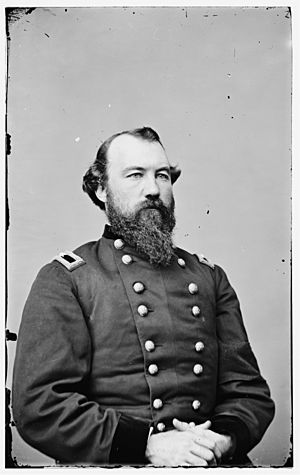John Baillie McIntosh facts for kids
Quick facts for kids
John Baillie McIntosh
|
|
|---|---|
 |
|
| Born | June 6, 1829 Fort Brooke (Tampa), Florida Territory |
| Died | June 29, 1888 (aged 59) New Brunswick, New Jersey |
| Place of burial |
Elmwood Cemetery, North Brunswick, New Jersey
|
| Allegiance | Union |
| Service/ |
|
| Years of service | 1848-1850 (Navy) 1861-1870 (Army) |
| Rank | Midshipman |
| Unit | 2nd U.S. Cavalry |
| Commands held | 3rd Pennsylvania Cavalry 2nd Brigade, 2nd Division, Cavalry Corps, Army of the Potomac 1st Brigade, 2nd Division, Cavalry Corps, Army of the Potomac 1st Brigade, 3rd Division, Cavalry Corps, Army of the Potomac |
| Battles/wars | Mexican-American War American Civil War |
John Baillie McIntosh (June 6, 1829 – June 29, 1888) was a Union Army general during the American Civil War. Even though he was born in Florida, he chose to fight for the Union. His brother, James M. McIntosh, fought for the Confederate side and was killed in battle.
Contents
John Baillie McIntosh: Early Life and Career
McIntosh was born in Tampa, Florida, at a place called Fort Brooke. His father was serving in the Army there. When he was younger, McIntosh joined the United States Navy. He served as a midshipman during the Mexican–American War. This war happened between the United States and Mexico. After the war, in 1850, he left the Navy. He then started a business in New Brunswick, New Jersey.
Serving in the Civil War
When the American Civil War began, John B. McIntosh joined the Union Army. He started as a second lieutenant in the 2nd U.S. Cavalry. He quickly moved up in rank.
Early Battles and Promotions
In April 1862, he became a first lieutenant. He fought in several important battles. These included the Seven Days Battles and the Battle of Antietam. Between these two battles, he was promoted to major.
On November 15, 1862, McIntosh became a colonel. He took command of the 3rd Pennsylvania Cavalry regiment. In this role, he began leading larger groups of soldiers. He became a brigade commander in the Cavalry Corps. This was a major part of the Army of the Potomac. He led his brigade during the Battle of Chancellorsville campaign. His division commander, William W. Averell, praised his leadership.
Gettysburg and Later Service
After the Battle of Brandy Station, the Cavalry Corps was reorganized. McIntosh was given command of a brigade in the second division. This division was led by David McMurtrie Gregg. McIntosh was sick after Chancellorsville, but he was present at the Battle of Gettysburg.
He played a key role in the cavalry fight on July 3, 1863. This battle was against Confederate General J.E.B. Stuart. When a Confederate attack was at its strongest, McIntosh led his men in a surprise attack from the side. This helped turn the tide of the fight.
In September 1863, McIntosh was injured when he fell from his horse. After he recovered, he served in the defenses of Washington, D.C.. He stayed there until May 1864.
Final Campaigns and Retirement
McIntosh returned to the Army of the Potomac. He was assigned a brigade in the third cavalry division. He fought under James H. Wilson during the Battle of the Wilderness. He continued to serve under Philip Sheridan in the Shenandoah Valley Campaign.
On September 19, 1864, McIntosh was seriously wounded at the Third Battle of Winchester. He lost a leg because of this injury. Even after his injury, he received several honorary promotions. He was made a major general in the U.S. Volunteers. He also became a brigadier general and then a major general in the regular U.S. Army. He retired from the army in 1870.
John Baillie McIntosh passed away in New Brunswick, New Jersey. He is buried in the Elmwood Cemetery.
 | Calvin Brent |
 | Walter T. Bailey |
 | Martha Cassell Thompson |
 | Alberta Jeannette Cassell |

